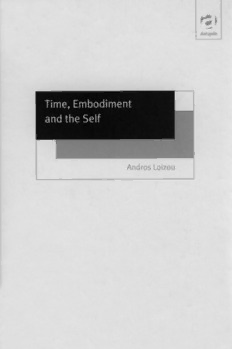
Time, Embodiment and the Self PDF
123 Pages·2000·5.259 MB·English
Most books are stored in the elastic cloud where traffic is expensive. For this reason, we have a limit on daily download.
Preview Time, Embodiment and the Self
Description:
Beginning with a sustained argument against the tenseless theory of time and against McTaggart's A series/B series distinction, the author of this essay goes on to provide a non-paradoxical, tensed, phenomenologically-based account of the "going on" or "taking place" of events in time that escapes the paradoxes endemic to "passage" as understood via the A series/B series distinction. The author then turns his attention to the other main aim of the essay, which is to seek an understanding of time adequate to those more "embodied" conceptions of the self that place character, and with it the "constitutive attachments" or "ground projects" of individual life circumstance, at the centre of the self. This involves a "redrawing" or the self informed by a wider conception of the will than the one we have inherited via Descartes and Kant, by an account of ground projects, and by the theory of the tripartite psyche in Plato's "Republic". It also involves extending the account of time developed in the second chapter in a way that draws on the notion of "ecstatic temporality" that originates with Heidegger.
See more
The list of books you might like
Most books are stored in the elastic cloud where traffic is expensive. For this reason, we have a limit on daily download.
